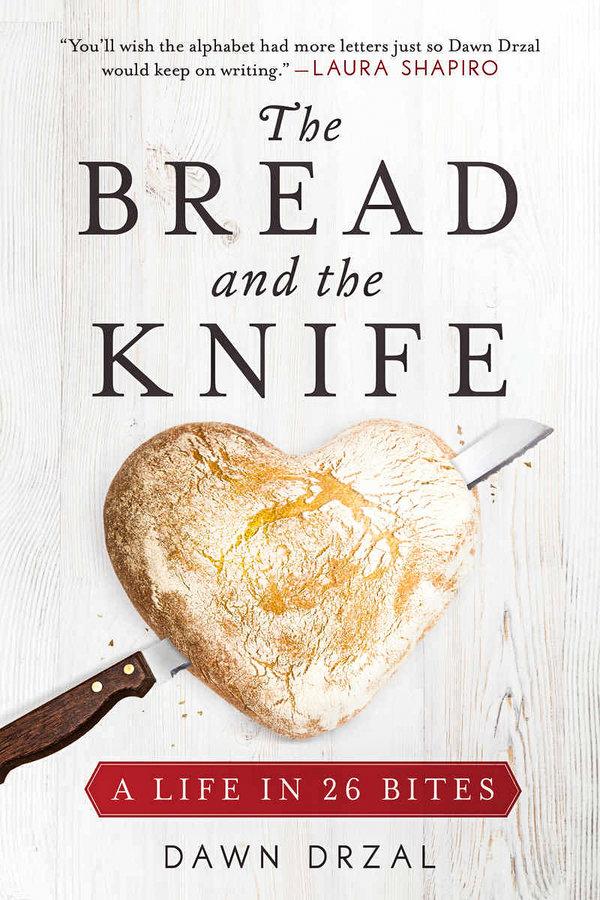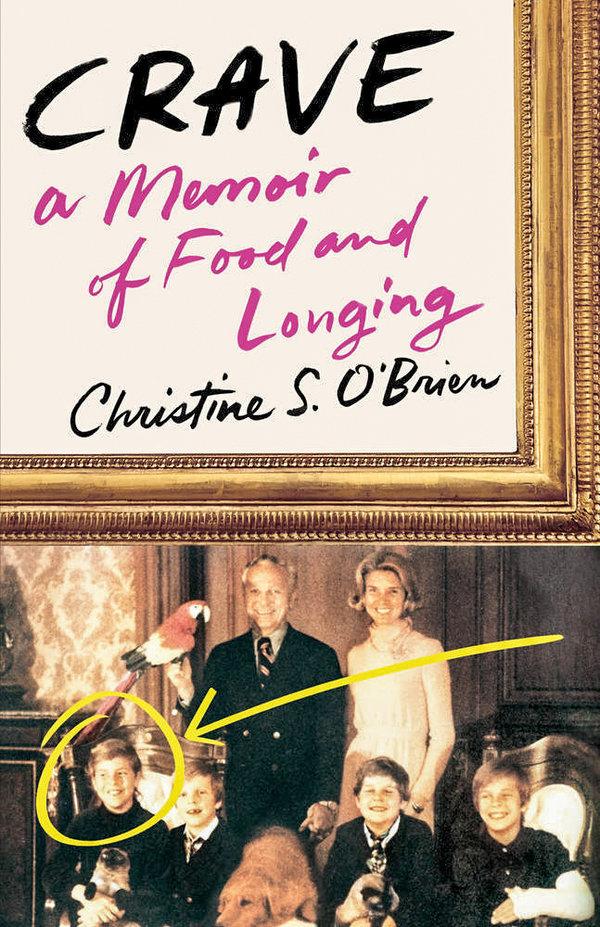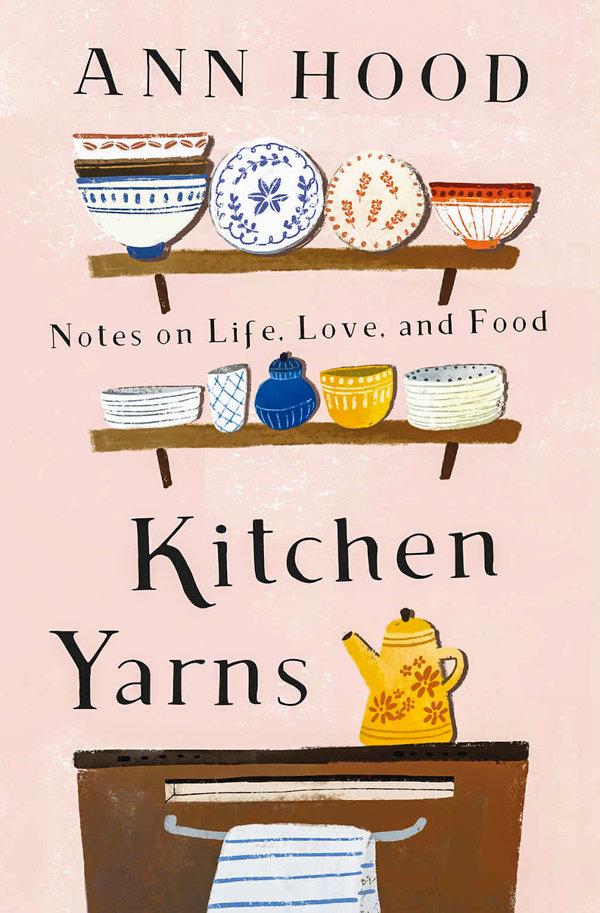THE BREAD AND THE KNIFE
A Life in 26 Bites
By Dawn Drzal
257 pp. Arcade. $19.99.

Culinary memoirists often seem torn between telling a story and sharing their favorite dishes. As befits a former cookbook editor, Drzal centers the food, offering us an alphabet of 26 gastronomical essays ranging from “Al Dente” to “Zucchini Blossoms.” A sprinkling of recipes completes the
collection.
Reading these evocative pieces feels like pulling old Polaroids out of a shoe box. “F” is for “Fowl,” a freshly shot pheasant Drzal cooks for M.F.K. Fisher. The result is so tasteless and tough that Fisher nearly chokes to death. “L” is the exquisite lobster roll Drzal springs for at the Clam Shack in Kennebunk, Me., as she comes to terms with both her divorce and her reduced bank account. “T” recalls the messy tarte Tatin she bakes for her dying father-in-law, and her quiet pleasure when he eats a full slice.
Drzal traces the delicate emotions packed into a scene with the precision of a miniaturist. She is particularly skilled at conveying the quality of pleasure taken in the face of loss. A 1990 dinner party in her Brooklyn brownstone achieves a perfect alchemy of guests, food and music, and is crowned by an enchanting snowfall outside. The moment feels sublime to Drzal. But when she runs into one of the guests 15 years later and is given the cold shoulder, she realizes that all the human connections at that party, including her marriage, were “as ephemeral as the meal.”
While food provides the hooks for Drzal’s memories, the collection thrums for other reasons: her moments of unflinching but forgiving self-criticism, descriptions of place that transport readers with a minimum of detail, and a knack for metaphors so perfect as to seem inevitable. In Southeast Asia, after enduring a “dispiriting” meat-and-potatoes meal, Drzal realizes that her husband travels like a turtle, carrying his home with him, while she is a hermit crab, taking on new identities in each place. But there is another man on this trip, a prospective lover she doesn’t yet know is “a hermit crab who crawled into the shells of other people’s marriages.” A lesser writer might have stopped at the dish.
CRAVE
A Memoir of Food and Longing
By Christine S. O’Brien
260 pp. St. Martin’s. $28.99.

O’Brien’s father is Edgar Scherick, a celebrated producer of television and film. Her mother, Carol, slips from one identity to another, but always ambitiously: The Missouri farm girl morphs into a Miss America pageant finalist, the upper-class New York wife rebels and becomes a natural food devotee. O’Brien and her brothers live in the Dakota and trick-or-treat along the building’s forbidding hallways, getting Tootsie Pops from Lauren Bacall. This is one version of a 20th-century fairy tale.
The fable has a dark side. O’Brien’s father is given to terrifying outbursts of anger when under stress, which is often. Her mother suffers from a series of health problems, which she begins managing with food. Embarking on a lifetime of restrictive diets, Carol decides that her family will come along for the ride. Soon the children are put on “The Program” by an unlicensed doctor whose Mafioso clients keep watch on the street lest he be jailed. From then on, the kids are sustained — barely — by blended salads, celery juice, egg yolks and the occasional handful of nuts.
It’s remarkable how little anger O’Brien conveys in relating her mother’s disordered approach to eating. The children follow Carol’s instructions more or less obediently, despite being divided from normal society by their inability to enjoy simple treats. When O’Brien caves and eats a Ho Ho, she’s horrified at having “erased my hard work and all the purity” she had worked for. Perfection seems to be the price of her mother’s affection, an exchange that will have lifelong repercussions for O’Brien’s relationship to food.
The story drags at times. O’Brien’s father seems always to be “whiny” and “high-pitched” when on the verge of rage. Reading about a diet of puréed vegetables is almost as tiresome as living on one. But O’Brien describes her unusual childhood with loving generosity. She captures her father’s vulnerability and creative brilliance, and recognizes her mother’s pioneering, seeking spirit. After all, this was a woman who embraced Ayurveda, meditation and co-op shopping long before they became mainstream. The family’s story is one of renunciation, but not, ultimately, one of hunger.
KITCHEN YARNS
Notes on Life, Love, and Food
By Ann Hood
232 pp. Norton. $24.95.

Hood’s essays are like hot chocolate, cozy and warm. Her collection of meditations on food and life touches the big themes: grief for a brother and a small child gone suddenly, two divorces and the end of a grand affair. Still, Hood describes them with the easy intimacy of a friend, confessing her foibles as she stirs a pot of red sauce. The recipes closing each chapter hint that every heartache can be soothed by the deft application of cheese and carbohydrates.
Here, unlike in many food memoirs, the recipes carry the story. In some essays, Hood recalls her days as a young woman stumbling into sophistication. She models for the Jordan Marsh department store and flits around the world in a T.W.A. flight attendant uniform designed by Ralph Lauren. The brand names share their retro appeal with the meals she cooks at the time: a curried chicken salad snipped from Glamour, Chicken Salad Veronique, the spaghetti carbonara she falls for on a layover in Rome. These nostalgic foods intuitively convey the fleeting nature of youthful ideals, and how fervently they can be held.
Other tales focus on homely simplicity. Hood slips into her Italian-American mother’s kitchen, though she never quite manages to get the knack of rolling out meatballs like Mom does. The accompanying recipe comes with a warning: “Gogo” never measures out her ingredients, and besides, “she always wants her food to be better than yours.” Later, Hood recalls the quiet joy of making weeknight dinner while her children stand on stools beside her and help. The roast potatoes her son improvises are, appropriately, “best made by a child under the age of 10.”
The book’s steady cheer might cloy were it not punctuated by loneliness. Hood is at her meditative best while wandering around Ikea, trying to assemble a new life after divorce. The store’s winding paths remind her of the Minotaur’s labyrinth. Instead of a ball of string, however, Hood comes out with a recipe for Swedish meatballs. There is, after all, deliverance in humble things.




